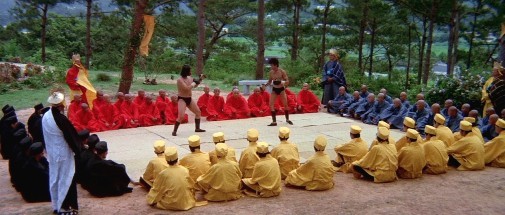How had I never seen...“Enter the Dragon”?
 Monday, October 14, 2019 at 1:00PM
Monday, October 14, 2019 at 1:00PM by Cláudio Alves
![]()
Like lots of people, I’ve long been familiar with Bruce Lee, the legend. He's referenced in films, podcasts, books, and other media, a prodigy of martial arts and a flame that burned bright and was put out too soon. He was and is an icon and his filmography has consequentially gained cult status and a place of honor in various canons. Despite this, until very recently I’d never seen a Bruce Lee movie.
Thanks in part to Once Upon a Time… in Hollywood, his most famous projects are readily available at the moment and here we are, exploring the greatness of Enter the Dragon. The 1973 flick was Lee’s first leading role in a Hollywood project and it was also the first American-made Kung Fu adventure. Much was riding on its success and it mostly paid off, turning Lee into a sensation and martial arts focused cinema into a viable investment for producers.
None of this was born out of a particularly decent story, though I often find myself bristling at the idea that cinema is, essentially, storytelling...

It’s difficult not to think that that's simultaneously too broad and too narrow a description. After all, what of experimental cinema or aesthetic marvels that have little to no story? Narrative isn’t the only type of cinema there is. To me, cinema is moving image and time, it is editing and audiovisual stimuli. Such words may smell like pretention, but through them, one can understand the appeal of certain films in a way that’s impossible when thinking of them as storytelling.
Enter the Dragon is garbage as storytelling. As a spectacle of color and rhythm, however, it’s pure delight.
The plot is dysfunctional storytelling at its most shambled, suffering from a meandering first act and two unnecessary protagonists that only distract from the film’s other hero and main attraction. That is, of course, Bruce Lee’s performance as a Kung Fu master hired by the British government. His mission is to infiltrate the mysterious private island of a crime lord, Han, who’s organizing an exclusive martial arts tournament. Lee is looking for speedy justice and violent retribution for his sister’s death, who preferred to kill herself rather than be raped by one of Han’s goons.

It’s boilerplate pulp, and not very good pulp at that. So, if you’re looking for coherent narrative or complex themes, look elsewhere. However, there are many pleasures to be found. There’s the beauty of yellow flashes against a backdrop of moving white. There are dozens of elaborate cages fragmenting a hall and turning the space into a living ornate organism. There’s human geometry, live snakes and the bright colored glory of Sheng-Hsi Chu’s costumes and Gil Hubbs’ cinematography.
 Above all else, there are fight scenes both numerous and extraordinary. As expected, Lee is at the center of the best ones, sculpting brutality into grace and violence into a murderous ballet. His body is like a brush painting the frame in quick precise motions, blurring the edges between the ugliness of human aggression and the beauty of watching an artist practice their craft with confidence. The big climax in a mirrored room is an astounding feat, fracturing each gesture into multiple perspectives, making a cubist masterpiece out of Kung Fu fighting.
Above all else, there are fight scenes both numerous and extraordinary. As expected, Lee is at the center of the best ones, sculpting brutality into grace and violence into a murderous ballet. His body is like a brush painting the frame in quick precise motions, blurring the edges between the ugliness of human aggression and the beauty of watching an artist practice their craft with confidence. The big climax in a mirrored room is an astounding feat, fracturing each gesture into multiple perspectives, making a cubist masterpiece out of Kung Fu fighting.
Throughout, Lee is magnetic, holding the audience captive, even in the middle of busy compositions and Hong Kong’s urban landscapes. He may not create a tridimensional characterization, but he manages to bring personality to humorless dialogues and fervor to the action scenes, effectively holding the film together with his charisma and powerful physicality. Bruce Lee wasn’t alive to see the triumph of Enter the Dragon or how it enchanted audiences all over the world, though his legend lives on. We shall always remember Bruce Lee, not because he was a great storyteller but because he was a luminous movie star.

Other episodes of this series:
M (31) by Mark Brinkerhoff
Rear Window (54) by Chris Feil
Z (69) by Mark Brinkherhoff
Cabaret (72) by Ben Miller
The Parallax View / Three Days of the Condor (74/75) by Lynn Lee
Farewell, My Concubine (93) by Tim Brayton
While You Were Sleeping (95) by Cláudio Alves
Memories of Murder/The Host (03/06) by Cláudio Alves



Reader Comments (3)
Still one of the best films I had ever seen.
Honestly, I saw Kentucky Fried Movie -- which ends with a long parody of this film -- about 5-10 years before I got around to seeing Enter the Dragon itself. Lee himself was great, but I remember so much more about the KFM version than ETD.
A action movie classic